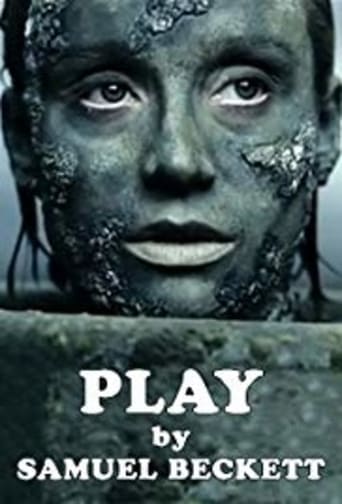Matthew Bond
Anthony Minghella follows much of Beckett's stage directions with his filming of "Play", but he also takes some pandering liberties that hurt the internal logic of the piece. In a stage production, we would see three characters in urns: from left to right, W1, the wife; M, the husband & lover; W2, the mistress. (This, by the way, was not Beckett's published arrangement, but one he chose when he directed "Play" some years later.) They are in urns, and we can see only their faces, covered with some of the same material as the urns. They speak only when a light, shone from below, is upon them, and the light flits from face to face, fragmenting each monologue, so that we slowly pick up the thread of the love triangle & that each of them is now in some afterlife, not knowing that the other two are beside. They speak rapidly and in a monotone, and the entire play is repeated.Minghella changes the light to a camera. He places these urns in a larger field of many urns, each babbling its own story, and he gives the feeling of old film, with the sounds of film rattling in the projector in the start & snapped off at the end. These are intelligent means of adapting the play to a film. He, however, cannot keep the camera still, so that we see the characters from the side, not merely from the front. This lessens the intensity & the logic of the questioning coming from a single point. Part of what makes "Play" effective theater is the strong sense of confinement. This is more difficult in a film, and even more difficult on video, but it loses even more of that sense when the camera cuts from one angle to another.The play is well-cast & well-acted. The actors keep to the rapid-fire rhythm & the flat voices. Minghella's rhythm gives nothing to an audience. We must pick it up on the fly, very quickly. If he could only have kept the camera still, close up, face front, then it would've been perfect.
mcellis-1
This is a brilliant work, and for me the highlight of the Becket on Film Series. "Play" tells of the horror, the purgatory of broken human relationships. Yes it is banal, yes it is repetitive, but that is precisely the point. The menage a trois depicted has trapped each of the three characters in an endless hell, the same thoughts over and over, the same self-justifications, the same loss. No one can hear the others. Mingella brilliantly shows us in cinema what could never be shown on stage, that this pain goes on forever, to the end of life and even into death. In showing the three urns surrounded by hundreds of others, we see everyone else trapped hopelessly within the tyranny of their private griefs. The most challenging, the most arresting short film i have ever seen. Highly recommended.
dbborroughs
One would think that three people sitting in urns, not moving, telling the same story twice would be dull and boring, but its not. Using cross cutting and cinema tricks to make what on stage is a very static, very dull and over rated piece of twaddle, Anthony Minghella had fashioned an interesting and quite stimulating piece of film. What the point of it all is or is not I will leave up to the viewer. The real achievement of this film is how it makes essentially a play where nothing physically happens into a movie with motion and movement and excitement (of a sort). Film students would be hard pressed to find a better example of what it means for the cinema to be in motion.
Matthew Tantony
This, being cutting-edge modern drama, I approached with not a little trepidation when Channel Four started its "Becket on Film" season. I'd already watched the five-minute short "Catastrophe" with John Gielgud and I didn't know what the hell that was on about.For the newcomer, "Play" is bizarre and difficult to get to grips with. Three disembodied heads gabble away incessantly in monotone voices, each relating their own versions of a love triangle while a frantic CCTV camera cuts between them. I applaud Becket's decision to play the story twice, as otherwise I would not have fully appreciated this complex tale.Essentially, "Play" is "Rashomon" at Warp 9. The shaky, noisy camera cuts between the three heads (Kristin Scott Thomas, Alan Rickman and Juliet Stevenson) as they fulfill their punishment to talk about their sins for eternity. It gets more and more frantic,cutting away first in mid-speech, then in mid-sentence, then in mid-word. Then Stevenson starts laughing hysterically. At times the film itself breaks down, as if it has been retrieved from hell itself.At the end of 15 frantic minutes I was left a little confused by the three-layer dialogue. I shall need to watch this a few times, preferably with a script, to pick out the separate narrative strands. However, Minghella's direction was nothing short of sensational. He may have taken liberties with Becket's original text, but the rapid cross-cutting, repetition and the intrusive whir or the camera as it selected its target, made for one of the most breathtaking fifteen minutes of film I have ever had the privilege to see. This will not appeal to everyone, but I recommend it to the more adventurous viewer.


 AD
AD


